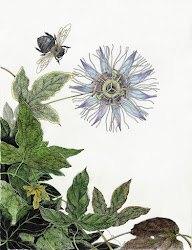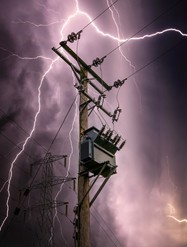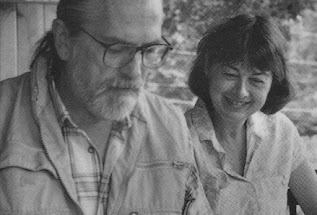I've known Peter Loewer for a good number of years as I used to work with his other publishers. He and his wife Jean hosted a delicious lunch for me and Linda-Marie at their incredibly beautiful home next to Lake Kenilworth in Asheville.

He is the master of all things having to do with gardening, hence all his previous books. For a complete list (you'll be blown away), see below my interview. His writing, beautiful artwork

,
radio show and teaching as "
The Wild Gardener" have brought him fame and fans from around the country.
Unlike his many previous books though, The Last of the Swindlers is
a retro murder mystery, published by Pisgah Press. It's set in the Blue Ridge Mountains of Western North
Carolina in 1978. Earlier in his life, Peter worked as the editor of a
small-town newspaper, and he drew on those experiences to create the novel.
Pisgah's synopsis is spot on:
As the publishing trade begins its transition from
traditional cold-type to electronic publishing, The Last of the Swindlers
captures the magic of story-gathering and small-town politics as it evolves
into tracking down a double murderer, a smuggling ring, and fraud. The
protagonist, Oliver Swindler, risks his own life and that of his new-found
girlfriend and coworker, Adrian, to solve the many layers of mystery that
beset idyllic Fernglade, NC.
The novel also previews, in an unexpected way, the current
phenomenon of wealthy big-city residents’ flight to smaller, less urbanized
areas of the country. Although today’s migration is to escape the Covid-19
pandemic, the book paints a wry picture of self-indulgent rich people’s search
for an “undiscovered paradise” (with, of course, all the comforts of the
big city).
Here is my interview where you'll find out about Peter chatting with animals, his perfectly reasonable fear of lightning, and walking in the government's secret tunnels under Pennsylvania.
Peter, tell me about where you live and why you love it so much.
Asheville is a city that immediately upon settling within its borders, drags new residents into a continuing love-hate relationship. In my case, it forced me to bear fidelity to my neighborhood known as Kenilworth--because the founder, Mr. Jake Childs, loved Scotland and the novels of Sir Walter Scott—but allowed me to (occasionally), modify my expectations, extoll my surroundings, pledge to forget those surroundings, tolerate my surroundings, but always try to save Asheville from itself.
Where were you living when you were 7 years old? Are they fond memories?
Until the early 1960s, my family lived in Buffalo, New York,
not far from elm tree-lined Humboldt Parkway, the
Buffalo Museum of Science, and another famous neighbor,
Kleinhans Music Hall. I had parents that knew how exciting the world really was. Also, having a father who took me to matinees at the Erlanger Theater and to old bookstores, and knew from my protestations that baseball games were not one of my favorite things to attend. He was also an aircraft designer at
Curtiss-Wright. My mother was a dress designer for years--and because of business connections--loved movies almost as much as I did--and during WWII ran
Russian War Relief for the city. They are for the most part, fond memories.
Is there a book that changed the way you look at life?
Yes,
Mysterious Island 
by Jules Verne

.
It’s the sequel to
Twenty Thousand Leagues Under the Sea, and tells the adventures of five northern prisoners (four white men and one Black) who escape from a Civil War detention by stealing a working observatory balloon and flying off in wild storm. Eventually falling to an uncharted volcanic island in the Pacific, by dint of uniting their various abilities, they all successfully work together in building and maintaining a viable camp, staying alive by knowing what the island can offer in survival treasures, and eventually constructing a boat for a return to civilization. I read it when ten, again when I was forty, and a few years ago at seventy. It is a marvelous book and an aid to having a great education.
Do you have a favorite children’s book and what about it makes it so?
Any book written and illustrated by Hugh Lofting,

concerning Doctor Dolittle and his life as a vet and a respecter of animals,

a respect I have celebrated and followed my entire life. And, yes, I talk to animals, too.
What are the funniest or most embarrassing stories your family tells about you?
I have suffered embarrassments both at home and abroad but the greatest that remains tellable, revealed my fear of electricity. A group of some ten friends and neighbors were sitting on the front porch of our once home in upstate New York, where I had warned the group about the power of lightning and electrical storms, when not ten feet away, a bolt of sheer white energy struck the telephone pole in the driveway.

Upon striking, I was left speechless and numb, needing a glass of Scotch to recover.
How did you meet your beloved? How did your first date go?
Jean and I met as art students at the Albright Art School, a division of the University of Buffalo

. On our first date I took her to the Town Casino, a downtown Buffalo club to hear Johnny Ray in person. The cost of living was then much less than today and I worked extra hours at a local drugstore to replace some of the money I spent. We also went for walks at the Albright Art Gallery and The Buffalo Museum of Science. I dragged her to a lot of movies, which she approached with a good sense of humor, not liking movies as much as I do.
But everything else eventually jelled.

Is there a song, person, or group that you listen to when you are feeling a bit down?
How are you different now than you were in your 20’s?
Hopefully, I continue to be inquisitive about the world of nature, knowing in my heart that there’s a lot more out there than dreamed of by most, and try to accept dealing with the continuing insanities of mankind in general—and hoping that womankind fights to stay above that sort of thing. Life is often a struggle, but boring, never!
Is there a question no one has ever asked you that you wish they would? Something, perhaps, that people would be surprised to know about you?
That among the most marvelous things about my life concerns being drafted into the U.S. Army, and assigned as a cryptographer to the
Underground Pentagon, buried beneath a mountain in southern Pennsylvania.
And while serving there being assigned to the State Department in Washington, when the Berlin Airlift meant cryptographers were in short supply. In 1960, President Kennedy appointed Dean Rusk as secretary of state, and while I worked as a cryptographer, Mr. Rusk participated in the negotiations for the 1963 test ban treaty and in conferences on the Berlin situation. I might add, he supported economic and military aide for Korea.
Your thoughts on independent bookstores?
Until the virus struck, I did a number of lectures at various garden associations across the country. I fiercely remember that whenever I booked a hotel room, I asked those in charge the location of the nearest independently owned bookstore... In all those years, I never came home without a new book to add to our library at home.
And finally, in a short essay…………………………
IF YOU COULD GO BACK IN TIME
to any period from before recorded history to yesterday,
be safe from harm, be rich, poor or in-between, if appropriate to your choice,
actually experience what it was like to live in that time, anywhere at all,
meet anyone, if you desire, speak with them, listen to them, be with them.
When would you go?
Where would you go?
Who would you want to meet?
And most importantly, why do you think you chose this time?
It’s a difficult choice to make but because of language difficulties, and as mentioned above, the importance of being safe from harm--plus a reasonable bank account to pay for train rides north to Edinburgh. Yet having only a rudimentary knowledge of civilized German, but a good command of English, wins me the biggest slice of fruitcake. It would have to be London towards the end of the Victorian Era,
a time when the incredible English estates were at their height, and the world of literature saw England living up to the reputation of being the world’s home where the development of fiction is a state of the arts.
Obviously, I would have to be a middle son in a fairly successful family, the older son eventually, becoming heir to the estate, and not the younger son, always wishing to be somebody else, but, say the son between, having a respectable public-school background (with moderate honors—nothing too pushy), thus giving me the chance to meet some of the great and near great writers of the day. I did a quick Wiki-check and there would be some 275 men and women writers of some note that I might meet at an afternoon gallery showing, or a fashionable tea party, remembering that even those of lowly ascent, if neat and clean, plus some pocket cash, could go to the Ritz for tea.
There are too many writers of note that would have to be visited to be mentioned in a story, unless it be about 1905—Edward VII now the king-- and the great estate of Chatsworth has a fire, quite short of burning out-of-control--and without any injuries—leaving some 30 people of note (often on both sides of The Pond), milling about on the lawn, all there for a great weekend Festival of Fiction, including, among others
Bram Stoker

(The
Lair of the White Worm is horrifying),
C. S. Forester

(the
Hornblower novels are seamanship at its best),
Nancy Mitford

(combining imagination with a great wit),
H. G. Wells

(
The Invisible Man his best yet),
William Archer

(a marvelous drama critic and expert on Ibsen),
a very young Bertolt Brecht

(the music is of greatness),
Liam O’Flaherty

(his short stories beat all),
Willa Cather

(nobody knew more about social order),
Aldous Huxley

(his futures included many wondrous things),
Thomas Hardy

(who wrote about lives of all sorts and the general crookedness of things),
Sinclair Lewis

(
Elmer Gantry never bested)
George Oliver Onions

(
Widdershins features strange tales),
Gertrude Stein

(of rose fame),
Virginia Woolf

(who was a master of stream of consciousness) ,
Booth Tarkington

(even Bob Hope made a success of Monsieur Beaucaire),
Sir Arthur Conan Doyle

(great novels and a greater detective),
Vita Sackville-West and her husband Harold Nicolson

(both there because of Sissinghurst fame),
Wallace Stevens

(a lawyer by day and a poet by night),
and A. A. Milne

(the father of Pooh wrote
The Red House Mystery, a "locked room" whodunnit and a fine mystery.
Well Peter, I can certainly see why you would like to hobnob with those guests, what an amazing experience that would be! Perhaps we can also meet at the Ritz someday too!
Other books by Peter Loewer:

American Gardens
The Annual Garden
Container and Fragrant Gardens
Bringing the Outdoors In
The Evening Garden Fragrant Gardens
Evergreens: A guide for Landscape, Lawn, and Garden Gardening for Wildlife
Gardens by Design
Gardens of North Carolina
Hydroponics for Houseplants
The Inside-out Stomach
Jefferson’s Garden Loves Me, Loves Me Not
The Moonflower Native Perennials for the Southeast
Organic Gardener’s Annuals
Ornamental Grasses
Pond Water Zoo
Rodale’s Annual Garden
Secrets of the Great Garden
Seeds: The Definitive Guide
Small-Space Gardening
Solving Deer Problems
Solving Weed Problems
Step-by-Step Annuals
Thoreau’s Garden Tough Plants for Tough Places
The Wild Gardener
Wildflower Perennials for your Garden
Wildflowers & Native Plants
The Winter Garden
A Year of Flowers
 He is the master of all things having to do with gardening, hence all his previous books. For a complete list (you'll be blown away), see below my interview. His writing, beautiful artwork
He is the master of all things having to do with gardening, hence all his previous books. For a complete list (you'll be blown away), see below my interview. His writing, beautiful artwork  ,
,  by Jules Verne
by Jules Verne  .
. concerning Doctor Dolittle and his life as a vet and a respecter of animals,
concerning Doctor Dolittle and his life as a vet and a respecter of animals, 
 Upon striking, I was left speechless and numb, needing a glass of Scotch to recover.
Upon striking, I was left speechless and numb, needing a glass of Scotch to recover. . On our first date I took her to the Town Casino, a downtown Buffalo club to hear Johnny Ray in person. The cost of living was then much less than today and I worked extra hours at a local drugstore to replace some of the money I spent. We also went for walks at the Albright Art Gallery and The Buffalo Museum of Science. I dragged her to a lot of movies, which she approached with a good sense of humor, not liking movies as much as I do.
. On our first date I took her to the Town Casino, a downtown Buffalo club to hear Johnny Ray in person. The cost of living was then much less than today and I worked extra hours at a local drugstore to replace some of the money I spent. We also went for walks at the Albright Art Gallery and The Buffalo Museum of Science. I dragged her to a lot of movies, which she approached with a good sense of humor, not liking movies as much as I do. 

 (The Lair of the White Worm is horrifying),
(The Lair of the White Worm is horrifying),  (the Hornblower novels are seamanship at its best),
(the Hornblower novels are seamanship at its best),  (combining imagination with a great wit),
(combining imagination with a great wit),  (The Invisible Man his best yet),
(The Invisible Man his best yet),  (a marvelous drama critic and expert on Ibsen),
(a marvelous drama critic and expert on Ibsen),  (the music is of greatness),
(the music is of greatness),  (his short stories beat all),
(his short stories beat all),  (nobody knew more about social order),
(nobody knew more about social order),  (his futures included many wondrous things),
(his futures included many wondrous things),  (who wrote about lives of all sorts and the general crookedness of things),
(who wrote about lives of all sorts and the general crookedness of things),  (Elmer Gantry never bested)
(Elmer Gantry never bested)  (Widdershins features strange tales),
(Widdershins features strange tales),  (of rose fame),
(of rose fame),  (who was a master of stream of consciousness) ,
(who was a master of stream of consciousness) ,  (even Bob Hope made a success of Monsieur Beaucaire),
(even Bob Hope made a success of Monsieur Beaucaire),  (great novels and a greater detective),
(great novels and a greater detective),  (both there because of Sissinghurst fame),
(both there because of Sissinghurst fame),  (a lawyer by day and a poet by night),
(a lawyer by day and a poet by night),  (the father of Pooh wrote The Red House Mystery, a "locked room" whodunnit and a fine mystery.
(the father of Pooh wrote The Red House Mystery, a "locked room" whodunnit and a fine mystery.









Comments